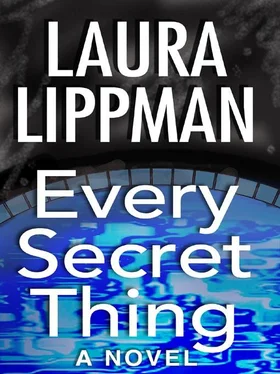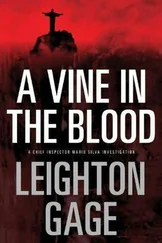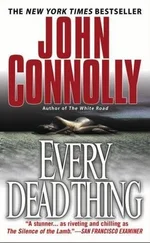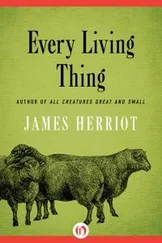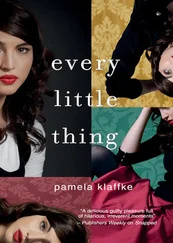“Sleeping all along,” Infante repeated. “Well, then, let her sleep. And you, too. Squeeze in a catnap, and I’ll keep watch in case she wakes up, and then I’ll jump in there. Hey, how’d you know where to find her?”
“Hunch.” An honest answer, Nancy told herself, just not a complete one. She would tell Infante the whole story in detail one day. One day, not tonight. Tonight, she found herself saying what she had said to Cyrus, her classmate, all those years ago. “I remembered this shack in Leakin Park from when my family used to go to the Millrace for crabs.”
“No sign of the missing girl, though.”
“None.”
“Did she try to run again?”
“No. She seemed almost happy to be found. It’s a scary place at night. It scared me.”
The girl had, in fact, lifted her arms to Nancy, taking on a supplicant’s posture that confused her. Then she realized: Ronnie was holding her arms out for handcuffs.
Nancy had not given any thought to the challenge of leading someone back along the dark, bumpy trail, much less a person in cuffs. She had assumed she was on a wild-goose chase for Brittany Little’s body. Did she have to use the cuffs? The fact that Ronnie was so ready to wear handcuffs should be proof enough that the girl wasn’t even thinking about running again. She had decided, after a fashion, to turn herself in.
But what if she did run, once back to the street? What if, once free of the dark, inexact shapes here in the woods, she pushed Nancy down, took her gun, or stole her car? There’s good Ronnie and bad Ronnie, Alice had warned. And bad Ronnie will do anything, and then good Ronnie can’t believe she did it . How could Nancy ever explain herself to Lenhardt, or the lieutenant, and all the way up the rest of the chain of command? She hated thinking things through this way, anticipating how she might fail and how others might react. But second-guessing herself was second nature to Nancy.
She had helped Ronnie Fuller stumble down the hill, her arms cuffed behind her, silent until they reached Nancy ’s car, a Toyota RAV-4.
“Is this a cop car?”
“It’s my personal car.”
“Oh.” And then, as if it were a social situation and she had to say something, anything: “It’s nice.”
“Thanks.”
Ronnie didn’t volunteer anything more, allowing Nancy to buckle her into the backseat as if she were a child being put in a car seat. Nancy adjusted the seat belt so Ronnie could lean forward, making space for her bound wrists.
“Where’s Brittany Little?” Nancy asked once they were on their way.
“Who?”
“The girl taken from Value City.”
“A girl was taken from Value City?”
“C’mon Ronnie. If you didn’t know a girl was missing, why did you run away?”
“Because you’re a cop, right? You’re the cop.”
“I’m a detective who’s investigating the disappearance of a three-year-old girl not even two hundred yards from where you work.”
“No, I mean, you’re the cop.” She waited for Nancy ’s confirmation. “The one who found the baby. I didn’t recognize you at first, but when I thought about it, I knew where I had seen you before. You don’t look much different. You wear your hair the same way.”
“How did you know what I look like?”
“My mom…” The word made Ronnie lose her train of thought. “Well, you were on television, right? Getting some kind of reward? And in the newspaper. Even later, after I was away, I saw you on television a couple of times. Didn’t I?”
“Yeah,” Nancy confessed. “Yeah.”
They rode in silence for a while. Without the opportunity to make eye contact, Nancy didn’t want to go too far into the subject of Brittany. But she could ask about Olivia.
“Why pudding, Ronnie?”
“What?”
“You fed Olivia Barnes pudding. We found these little pop-top single servings of pudding all over the shack. But if you bought pudding, you could have bought baby food. Didn’t you know you should give her baby food?”
“We didn’t buy anything. I took those puddings from my house.”
“Oh.” Nancy thought about this. Until asked and answered, the question had seemed portentous. All these years, she had been thinking about the pudding cups, and the explanation was so simple. Were all the answers as simple as this? If so, she might as well jump ahead, ask the only thing that mattered.
“Why did you kill her?”
“The baby, you mean?” Would Ronnie have to ask for clarification if she hadn’t killed more than one child? The simple fact of syntax filled Nancy with hope and dread, for if she was reading it right, Ronnie was all but confessing and Brittany Little was already dead.
“Yes. Olivia Barnes. The baby.”
Nancy could see Ronnie’s shape in the rearview mirror, but not her face. She was slumped to one side, her cheek pressed against the window glass. She waited so long to reply that Nancy thought she was ignoring the question, or sleeping. But at last she spoke.
“She was sad. She was very, very sad.”
Was Ronnie speaking of herself in the third person now? Was this the transition to bad Ronnie from good, or vice versa? Because surely a baby could not be sad, even in an eleven-year-old girl’s parlance. Unhappy, yes. Bad or mad. But who would ever describe a baby as sad?
“How did you know the baby was…sad?”
Again, a long time passed before there was any sound from the backseat. “It’s complicated,” Ronnie said at last, sounding like Alice when she had invoked her “past”-rehearsed, channeling words suggested by someone older. “It’s a very complicated story.”
She did not speak again for the duration of the ride. And now she was sleeping. Infante and Nancy studied her through the glass. In her T-shirt and jeans, she looked younger than she was. Yet she could have looked much older with minimal effort-a short skirt, a little makeup. That was the odd trick of eighteen, Nancy remembered. You could turn the clock forward or backward, be a kid when it suited you, or fool the world into thinking you were a woman. It was a time filled with promises. She had broken up with Andy the summer she was eighteen, taken a chance on the world at large. Then she ran back to him, realizing she shouldn’t reject the great luck of meeting her soul mate at age fourteen.
“First she runs, now she sleeps,” Infante said. “She’s like a textbook example of guilt.”
“She’s got to be exhausted,” Nancy said, a sense of fairness automatic with her. “She has had a pretty long day. And she seemed genuinely baffled when I mentioned Brittany Little.”
“You’re tired, and you’re not sleeping. The only difference between the two of you is she knows what happened to Brittany Little and you don’t. You think we should wake her up?”
“I’m telling you, it can’t be done. She’s dead to the world.”
The words hung on, and Nancy wished she had chosen a different way to say it.
Yes, Ronnie Fuller slept, but there was neither innocence nor guilt in her sleep, just a lifelong way of coping with a world that bewildered her. She had always been able to sleep, in almost any circumstances. She had slept through the night at the age of three months. As a toddler, she had dozed in the backseat of the family car, wedged so tightly between her brothers that her father said they didn’t need seat belts, not that the old Ford station wagon had any. She had napped in school, leading her teachers to suspect a chaotic home life that didn’t allow her to get enough rest, and they were half right. Ronnie had a chaotic home life, but she got plenty of rest, which saved her from much of it. Her bed was her one private place in a most unprivate household.
Читать дальше
